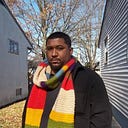What a Racial Reckoning in Dungeons & Dragons Can Teach America About Itself
It’s bigger than drow elves and trolls. The cult classic board game’s recent shakeup evokes how oppressors retain the status quo.
When I was around 10 years old, on an otherwise unremarkable Saturday afternoon at the Main Library in Downtown Columbus, Ohio, I had my life changed.
I was walking through the children’s area when I saw a large group of kids seated around two tables that had been pushed together. Sheets of paper covered every surface and everyone had their own set of weird candy-like dice. A young man older than the rest of the group sat at the head of the table with a cardstock screen standing in front of him, hiding hand-drawn maps on graph paper and several opened books from everyone else’s view. Based on the jocular nature of their conversation, the group seemed to still be setting up whatever they were doing, so I inquired about their activity. I was told that they were playing a game called Dungeons & Dragons.
Being a lover of games, I asked how it was played, but was informed that it was too complicated to recount in the moment. I asked if I could play and was summarily told by several kids at once that I could not, since they had already begun their game weeks…

